Former general and CIA director made KKR Global Institute chairman David Petraeus was joined by fellow KKR executive Vance Serchuk to conduct an interview with Privcap that I recently got around to watching, and if the geopolitical climate interests you then KKR seems to have good news – the world is improving. Though the interviewees made a point to acknowledge the various struggles and conflicts around the world, they mostly highlighted how good North America really has it relative to other regions.
There are some interesting points from the interview that your average American citizen would call counterintuitive. According to Mr. Petraeus, we are the “the largest natural gas producers in the world and we have an extraordinary comparative advantage when it comes to natural gas”, paying between $3.70 and $3.80 per million BTU’s (British Thermal Units) compared to $16 or $17 in China for the same amount. We are evidently not as fuel-starved as many people believe.
Compounded on this, Petraeus was optimistic on energy for North America as a whole thanks to allies Canada and Mexico “having quite a lot of energy resources of their own already.” The overall result according to KKR is that North America has a lot of economic freedom as they are not leashed by energy imports from foreign countries, compared to say, Western Europe which is dependent on Russian sources of gas.
Mr. Serchuk mentioned another North American advantage – relative age. Thanks to immigration, the average age of the US population is dropping as we begin to recover from our recession. Comparatively, China’s population is aging rapidly due to demographic difficulties while suffering major brain drain as the wealthy and academic elite leave for North America and Europe and deplete China’s intellectual resources.
An oversimplification of global politics? Definitely, but the takeaway is that while North America is well positioned for success in the near future, the impetus is on North American governments and companies to use that position to its full potential. Successful reform of government and a more global-minded cultural mindset could lead to major positive change, as the region certainly has the natural resources and tools available to make that happen.









